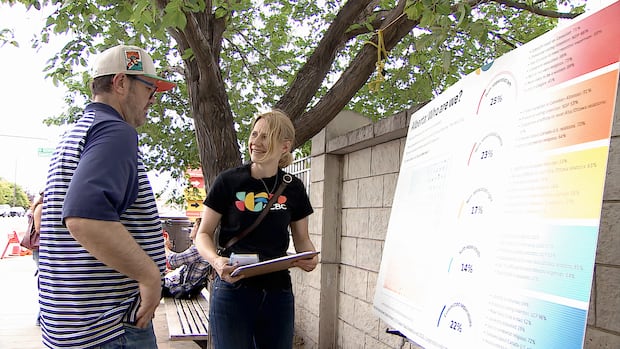We're on a mission to understand Alberta. Take this quiz and put yourself on the map
Polling data tells half the story. Now we want to hear from you
Alberta. We're big. We're beautiful ... and complex!
Our province is a great place to live, and if you've been here awhile, you know it's been changing. Our population is booming, we've gone through booms and busts. You might be new to Alberta, or a bunch of your neighbours are. The society is shifting, the economy is shifting, the politics are always shifting. So… what does it mean to be Albertan now? Right now. Today.
What do we all have in common? Something? Nothing? What's our identity? What do we MEAN when we say we are Albertan?
Well. We don't have the answers. But we're sure interested in asking the question. So….
CBC Calgary recently commissioned Janet Brown Opinion Research to do a poll. We asked 1,200 Albertans about their values, political positions and thoughts on Alberta. We reported on some of it here.
Now we want to expand on what we heard. We want to hear from YOU.
We're going to be at community events across Calgary talking with anyone and everyone. And if you don't see us, try this little questionnaire on your own.
It's only eight questions. Then you can see where you are in relation to what our large survey found about Albertans.
The results? Well, you may end up exactly where you thought you were, or, you could end up with a surprise. Anyway, it's fun to think about this stuff. If you want, you could do this with a class, or friends around a picnic table over a couple beers.
What does it mean to be Albertan? Who are we?
And because CBC is a broadcaster, we'd love to broadcast your thoughts. So, when you're finished the questionnaire, click on the video button below to share what you think, or just send an email to me, CBC producer Elise Stolte, at elise.stolte@cbc.ca.
If you want to be sure not to miss the stories about what we learn, subscribe to Your Calgary Weekly.
Step 1: Take the questionnaire
Online questionnaire
Paper version
Feel free to print the paper version and use it with a group.
Step 2: Reflection
The answers in your quiz gave you a number on separatism (vertical axis) and political values (horizontal axis). Find where you are on the Alberta values graph below and read descriptions of each segment of Albertans.
Then take some time to think through these questions:
- What does it mean to you to be Albertan? Or a Canadian?
- When it comes to being Albertan, what strength do you think being from this place gives you?
- What's one thing you'd like to change about what the rest of Canada thinks about Albertans and our story?
- If you moved here from somewhere else, at what moment did you realize you are an Albertan?
- Looking at that graph, if you had to give "Albertans like you" a cheeky group name, what would you say?
Step 3: Tell us what you think
On a phone or computer, click the video icon, listen to the prompt and record your key takeaway.
There's no download required. And you can tell us in the app if your video response is just for our ears, or if we can share it. We'll give it a listen and get in touch.
Understanding Alberta — a bit of a data dive
Alberta is home to people with views from across the political spectrum, and there are groups of people who tend to answer these questions in a similar way.
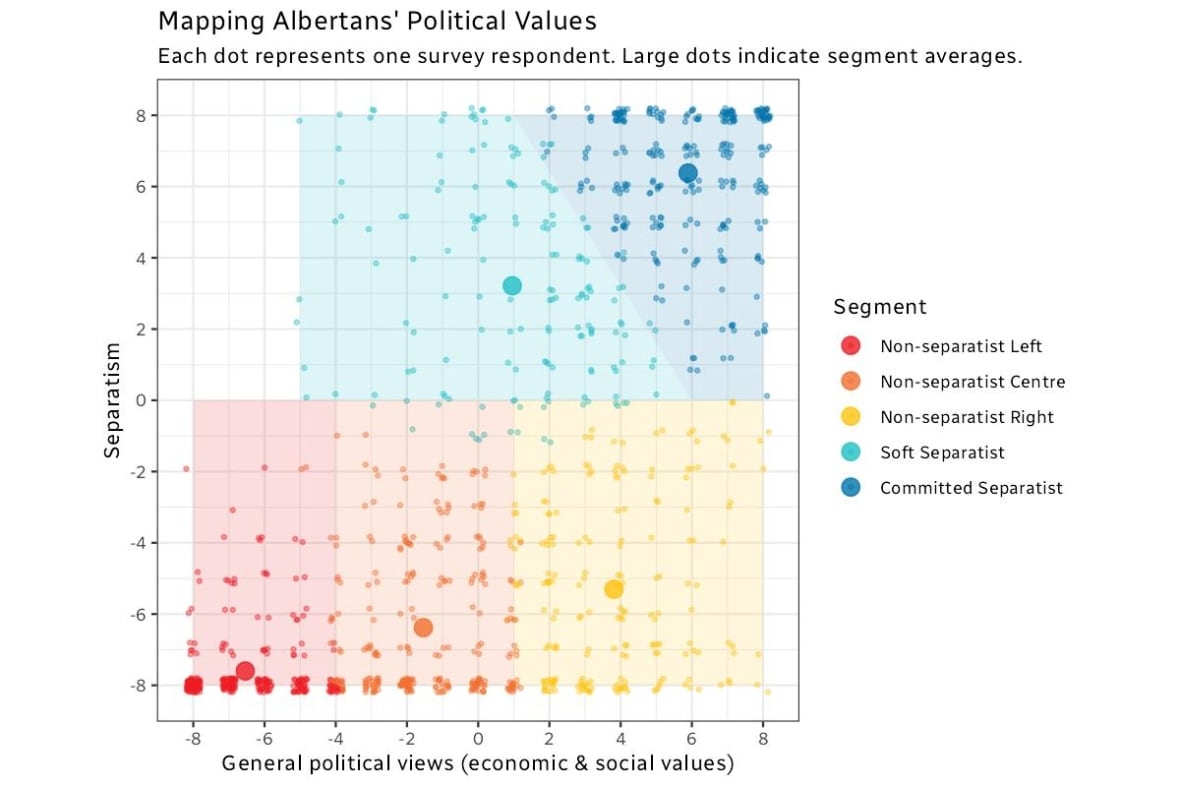
The data and statistical analysis below is based on the survey we mentioned run by pollster Janet Brown this spring. It might describe you; it might not — which could be just as interesting! And of course, any survey only captures a snapshot at a point in time.
Find the survey details at the very bottom of this page, and scroll down to find out what else this survey is suggesting about the different segments.

Non-separatist left
This progressive-leaning core is almost uniformly against the idea of separatism. You can find more of them in Calgary (43%) than in Edmonton (39%) or the rest of the province (19%). Here are a few other stats to describe some particulars about this cluster:
- Tend to be centre-left: avg 3.7/10
- Feel more attached to Canada than Alberta: 71%
- Provincial voting intention: NDP 86%
- Most say they disapprove of Premier Danielle Smith's recent efforts to reset Alta/Ottawa relations: 84%
- Would NOT vote to separate: 100%
- Many are university educated: 58%
- Most are stressed about the state of Canada-U.S. relations: 83%
- Many say it's easy to meet monthly expenses: 58%
- They are not very or not at all religious: 73%
- Likely to be women: 59%
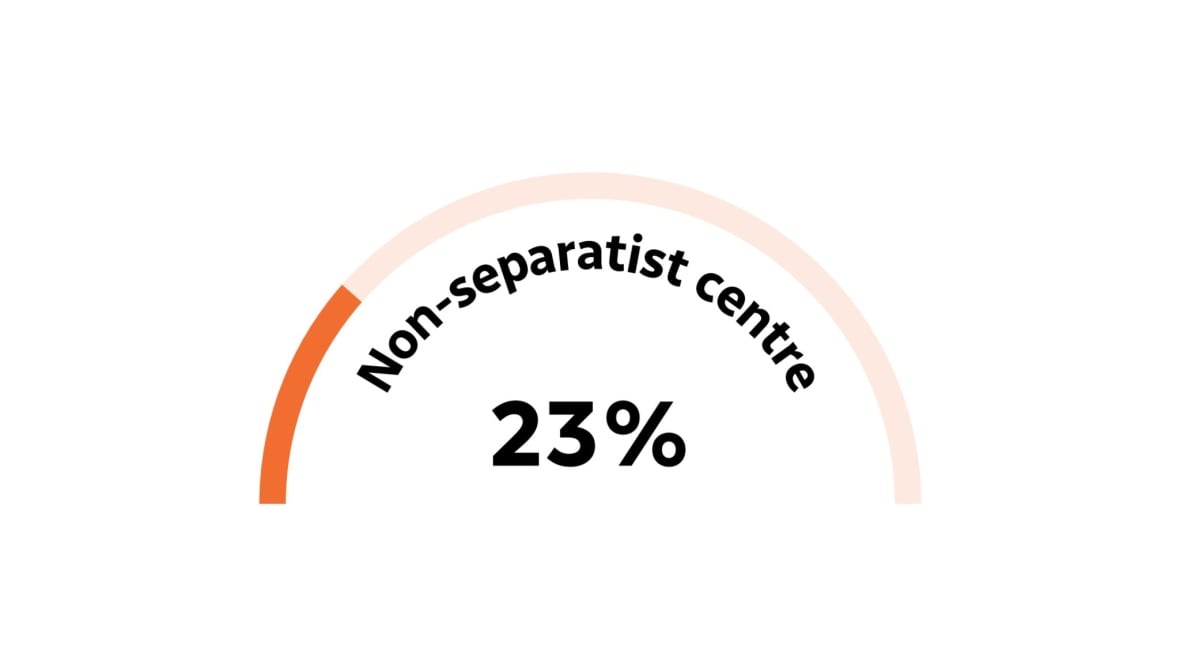
Non-separatist centre
This group falls in the centre politically, and therefore tends to play an outsized role in determining the result of any election. You'll find a lot of them in Edmonton (40%). Even more than in Calgary (33%) or in the rest of the province (26%).
- Where they fall on a political scale: avg 5.2/10
- Feel most attached to Canada, or equally attached to Canada and Alberta (44% CAN; 47% Equal)
- Provincial voting intention: NDP 53%
- Tend to disapprove of recent effort to reset Alta./Ottawa relations: 59%
- Would NOT vote to separate: 99%
- University educated: 47%
- Very or somewhat religious: 54%
- Likely to be women: 59%
- Split on if it's easy/difficult to meet monthly expenses: 50/50%
- Stressed about the state of Canada-U.S. relations: 75%
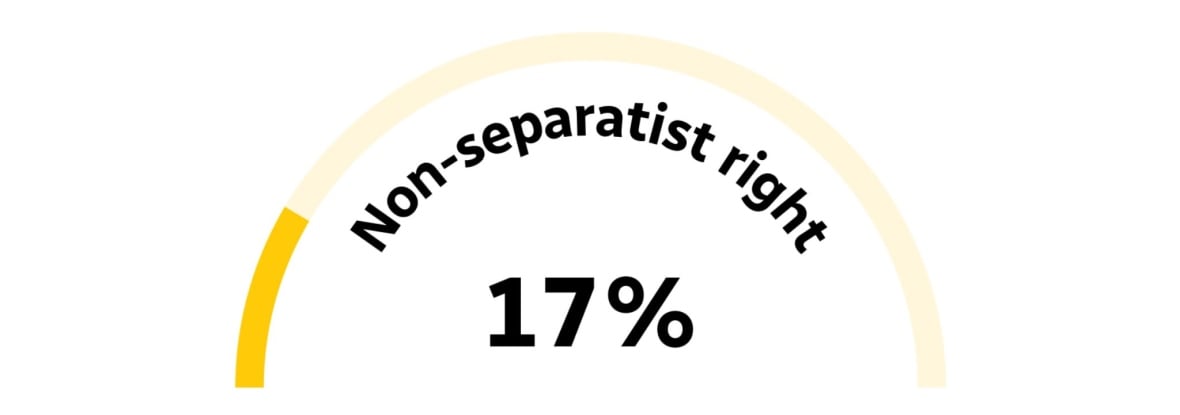
Non-separatist right
This group is right of centre on the political spectrum, but they are opposed to the idea of separating from Canada. Here are a few ways to describe them.
- Tend to be centre-right: avg 6.3/10
- Feel equally attached to Alberta and Canada: 53%
- They tend to approve of Smith's recent efforts to reset Alta/Ottawa relationship: 63%
- Provincial voting intention: UCP 66%
- Most likely group to say they're confident in their ability to save for retirement: 65%
- Somewhat likely to be stressed about the state of Canada-U.S. relations: 57%
- Would NOT vote to separate: 98%
- University educated: 38%
- Very or somewhat religious: 68%
- Likely to be men: 56%
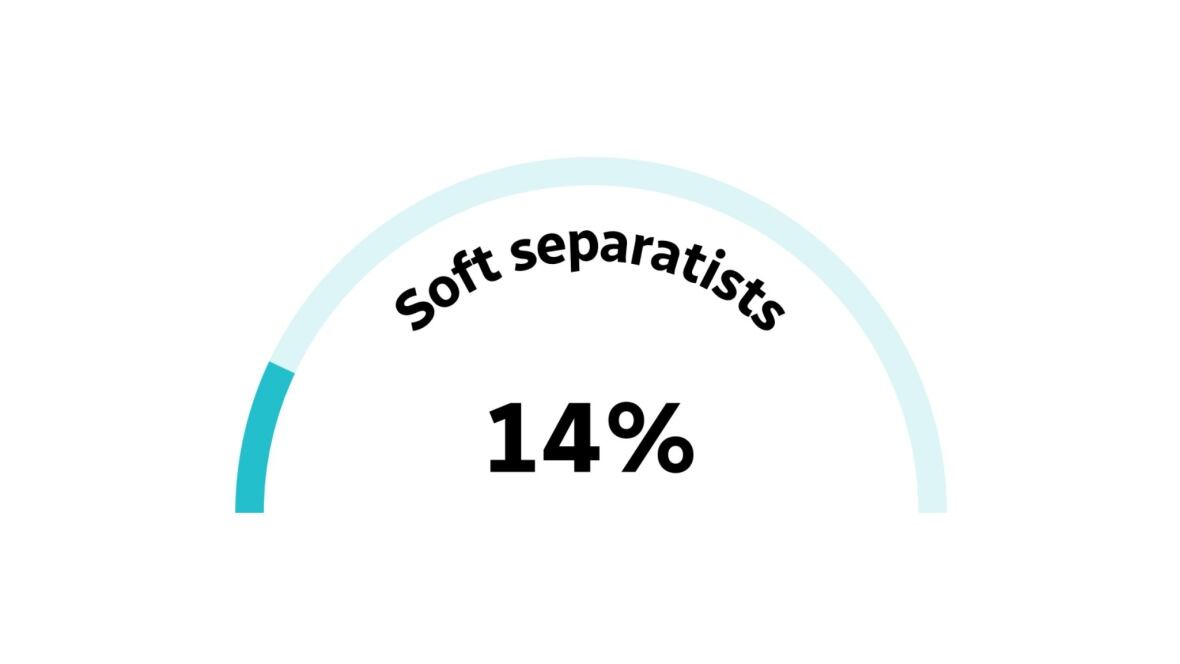
Soft separatists
It appears Alberta has virtually no left-leaning separatists. But there's a separatist cluster in the centre. They tend to like Premier Danielle Smith's efforts to get a new relationship with Ottawa and be a little less sure they would actually cast a vote to leave the country.
- Average political score is still right of centre: avg 6.8/10
- Feel most attached to Alberta: 56%
- Provincial voting intention: UCP 83%
- Approve of recent efforts to reset Alta./Ottawa relationship: 85%
- Say they would vote to separate: 55%
- Many say it's difficult to meet monthly expenses: 64%
- About half say they are stressed about Canada-U.S. relations: 52%
- Many self-identify as working class: 51%
- University educated: 33%
- Likely to be men: 54%
- Very or somewhat religious: 62%
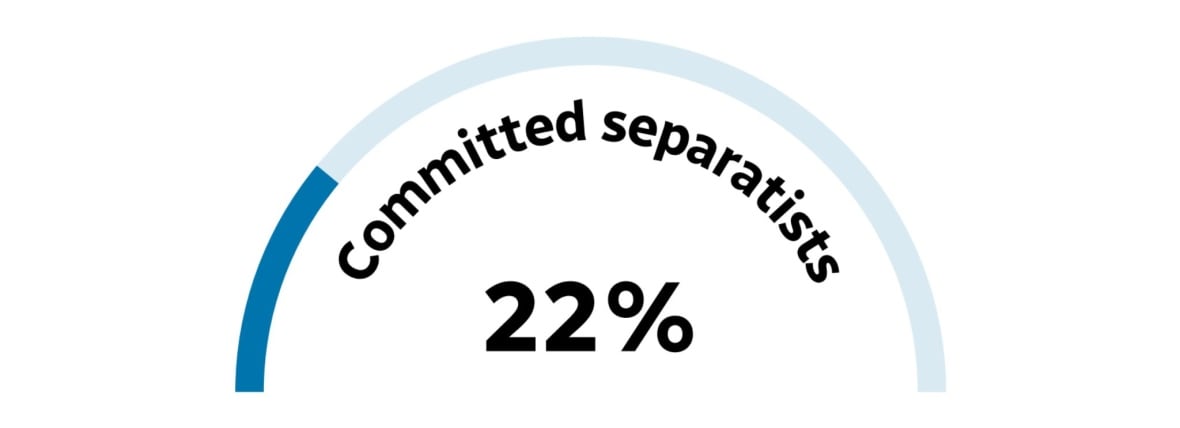
Committed separatists
This cluster describes the Albertans who are most committed to separatism. They tend to be farthest to the right on a political spectrum but it's a myth that they all live in rural areas. Actually, 39 per cent of them are in Calgary, 25 per cent in Edmonton and 26 per cent in other parts of the province. Here's what else the survey tells us.
- Tend to be solidly right: avg 7.7/10
- Primarily identify as Albertan: 89%
- Provincial voting intention: UCP 96%
- The vast majority approve of Premier Danielle Smith's efforts to reset the Alta/Ottawa relationship: 95%
- Most would vote to separate: 89%
- Many say it's difficult to meet monthly expenses: 60%
- Many say they're not stressed about Canada-U.S. relations: 68%
- More likely to be men: 62%
- Have a university education: 29%
- Very or somewhat religious: 72%
Survey details
The CBC News random survey of 1,200 Albertans was conducted using a hybrid method between May 7 to 21, 2025, by Edmonton-based Trend Research under the direction of Janet Brown Opinion Research. The sample is representative of regional, age and gender factors. The margin of error is +/- 2.8 percentage points, 19 times out of 20. For subsets, the margin of error is larger.
The survey used a hybrid methodology that involved contacting survey respondents by telephone and giving them the option of completing the survey at that time, at another more convenient time, or receiving an email link and completing the survey online. Trend Research contacted people using a random list of numbers, consisting of 40 per cent landlines and 60 per cent cellphone numbers. Telephone numbers were dialed up to five times at five different times of day before another telephone number was added to the sample. The response rate among valid numbers (i.e. residential and personal) was 12.8 per cent.

